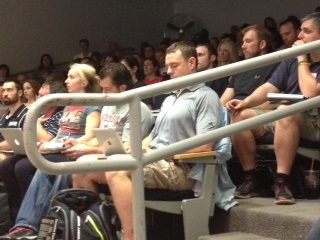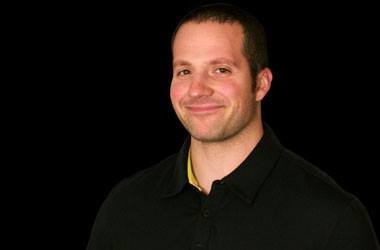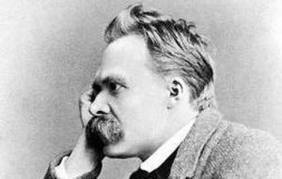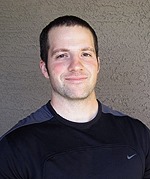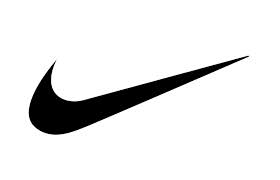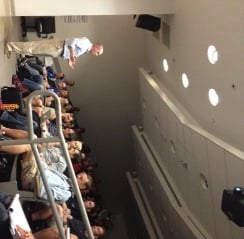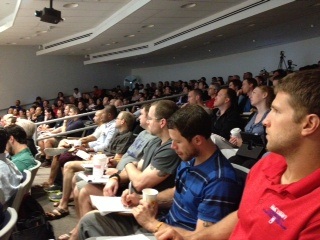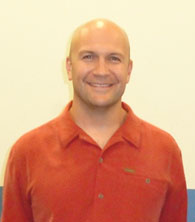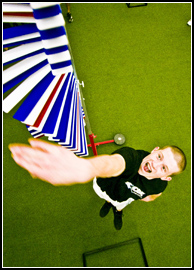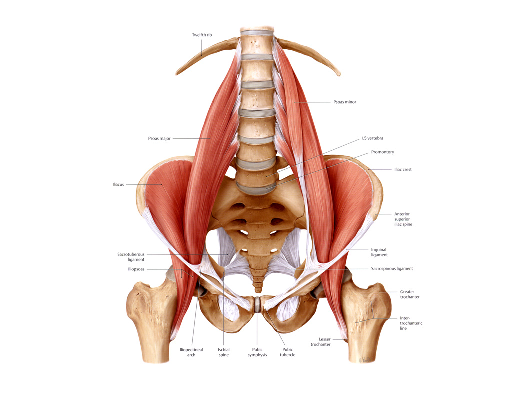An interview with Fergus Connolly following the 2013 BSMPG Summer Seminar.
After what Stu McGill at BSMPG, referred to as "the best presentation I've heard in 26 years in sport", I sat down with Fergus Connolly before he left Boston to explore in more detail the future of high performance sport here in the US. With the surge in sports analytics and ability to capture sports metrics along with a personal interest in managing and presenting data, Fergus’ presentation couldn’t have come at a better time
We discussed many things, but I started by asking him to give some insight into the future challenges professional sports faces in the US and what our professional teams needed to avoid in the future.
This is the transcript of some of the recorded interview.
"Give me six hours to chop down a tree and I will spend the first four sharpening the axe" - Abraham Lincoln
[Q]
Fergus, based your work with NFL and NBA teams – is US professional sport is going through a short phase of sports science or a critical changing period?
I've gone on record as saying I believe US sport really is at a very interesting crossroads just now, I think the preparation of professional teams is changing. There is a more informed awareness, media attention on performance, better appreciation of fatigue, about critical injuries, return to play approaches, a fascination in performance technology along with more and more data available for everyone - customer included!
These developments, along with a leveling off in advantages from analytical recruitment approaches mean the focus has now shifted to find Moneyball 3.0 - and it's pretty clear this new edge is going to be sports science. There's not a team I know that are not aware of the developments and changes they face. This a big challenge for the NFL and NBA teams to address - and most importantly to do it correctly. It's a big tree to chop.
And, so with such a big tree to chop down, to paraphrase President Lincoln - it's best spend the time sharpening the axe rather than swinging wildly.
So you think there are two attitudes or approaches to this?
Well, some teams are moving fast, but I notice the more progressive GM's and directors are doing due diligence, not being slow - but steady, asking better questions and identifying the pathway they want to move towards, not making knee-jerk decisions.
"Don't have time to do it right, but the money to do it twice."
[Q]
Ok, so accepting that these changes are here and coming, and recognizing care is needed to avoid knee jerk movements - what is the biggest challenge these teams and the performance staff face?
Ok, so looking at the two sports I know most about - and to simplify it greatly, the challenge is player volume management and game volume management - in the NBA it's about game volume management and in the NFL it's about player volume management. Unfortunately in many professional sporting situations, and I'm thinking of the NBA as one stand-out example from my experiences here in the US, the time pressures are immense.
Speak to guys like Bill Burgos, Bryan Doo, Keke Lyles or others and you'll soon learn 82 games a season with the travel demands combined leaves little time for much actual development - either player or staff. Everything is geared toward management of the player, game by game.
And football?
In the NFL you have far greater numbers training and it's a case of player management, individualization is much more difficult. So it's no wonder that it can be a "Time once, Money Twice" effect in pro-sport, where the teams "Don't have time to do it right, but the resources to do it twice." It's not a criticism - the sports almost demand it by design and all sports I've worked in are somewhat similar, whether it's the English Premiership or International Rugby. It's certainly difficult to keep the bigger picture in mind, but what is often missed - is that having to do it twice will cost twice as much and take twice as long regardless!
This is where the better organizations develop sports science, not slowly, but smoothly, introducing and investing in new positions and new technologies - and managing their implementation with clear long term goals in clear view for all.
"80% of Sports Science is knowing what NOT to do. The other 20% of the job is knowing how to deliver it"
[Q]
Well that brings us along nicely to the next question about Sports Science - which as you are well aware is the new buzz word - what do you see as the biggest challenge for sports science in the US?
Yes, Sports Science is probably the single greatest area of fascination in US sport just now, certainly in the NFL. I think it's a really good development for the player welfare first and foremost, and I'm glad to see teams like the Jaguars and the Eagles start to develop sports science programs.
I know Tom Myslinski for many years and have great respect for what he and the Khan family are doing, and I know Josh Hingst too at the Eagles. Neither are naive, they know the limitations and time it will take to develop the programs.
What about the NBA?
Good question Art, basketball is an interesting animal all on its own, however – I believe the first NBA teams to master and integrated sports science approach will benefit much more and more quickly in injury reduction and reduced fatigue. Simply because of the reduced player roster - these improvements will be much easier to affect. I also expect them to compete at a more consistent level.
But sports science is definitely here to stay?
Correct and the good news is that, for the US sports scientist today, it is very like being a child in a candy store - there are more toys available now than ever, it's like Christmas Day every day. However, the bad news is - "batteries not included" - some technologies will work, many don't and most only work in certain contexts. For that reason alone, I make it clear to teams that "80% of a good sports scientist’s role is to know what NOT to do, the other 20% of the job is knowing how to deliver it".
Very good point, but sports science is a very young field here with those with experience are few and far between.
True, but bear in mind, just because you have a technology and perhaps know how to use it, you still have to present and manage the delivery of this to the players and coaches too and make sure the outcome is successful.
One other confusing aspect of sports science is that people think just because you have something you have to use it. Think of it as if you were making a fruit salad - if you had tomatoes in the fridge you wouldn't use them in a fruit salad even though they are a fruit and just because you have them.
"Million Dollar Athlete and 2 Cent Therapist"
[Q]
Ok, so bearing that food analogy in mind - where can we expect to see sports science being used to its greatest effect in US pro sport?
I believe there are 2 broad areas sports science will impact, Injury prevention (or reduction) and improved on court/grass performance. US sport has clearly pioneered recruitment, and European and Southern Hemisphere sport has so much to learn from you. However, how you support the recruited athlete is equally important and has huge room for improvement in the US.
I’m glad you mentioned this. I often find that teams make tremendous investments in players yet when it comes to player health or development see this as an extra cost that they are not willing to put forward.
Yes. Good coaches or Performance Directors like Bill Sweentenham, the legendary Australian swim coach, used go to great trouble and make a point of recruiting elite level sports science staff to ensure his swimmers were the best prepared in the world and had no excuses. There's no point in having an elite athlete and not having the systems, resources and environment to support them. It's akin to buying a million dollar sports car and not having the money for engine oil or a service. Sure, it'll manage at first, but eventually fail and perform poorly given time.
But will this change in the US?
It is changing, I know two US NFL teams who are already applying some of the recruitment diligence standards to their staffing and resources as they do to players to avoid mismanagement. An old mentor of mine used refer to this as having the "Million Dollar Athlete and 2 Cent Therapist" approach. By "therapist" he didn't mean a person necessarily, rather the complete support structure.
The irony is that, I've found, in some of the most successful teams and organizations, quality athletes often recognize good support structures and accept slightly lower salaries to come work, compete and win in environments where the support is better.
“A system is people and technology – not technology alone”
[Q]
Finally, Fergus, read the future once more - what is the "next big thing" for physical preparation in professional US sport?
One of the next major developments and "fashions" in US sport will be a demand for computer systems to manage the myriad of data lines coming downstream from all the various technologies being introduced, rightly or wrongly. This will lead a rush for off-the-shelf software to address this problem. While this will bring it's own issues, it will miss the fundamental point - a system is not about software alone.
But if it's not about software, how are the data issues addressed?
Performance Systems by my definition, and at this stage I've built and implemented 3 completely different systems, are combined human and technology solutions - the people employed are as critical, perhaps more so, than the actual technologies and software. A “system” is people and technology together – not technology alone. More importantly the technology can't be off-the shelf or standalone - they must suit the team and environment concerned.
At Northeastern here Art, you've recognized the needs of the environment which has led to the integration of sports medicine and performance services as one - you also know you need to develop a solution specific to your environment with regards to data management – something most colleges haven’t even considered as of yet. I often warn teams that in many cases this - a performance management software system - is the single fastest way to throw money away, and you only have to look across at some manufacturing industries to see that. It is a pathway, a process and it's fluid, but controlled and it needs extremely careful management to ensure it succeeds.
So what you're saying is that it's a double edged sword?
Yes, just buying a few Catapult units isn't Sports Science. Anyone can do that - making it work and affect winning is what matters. Whether it's the NFL or NBA, the game will stay the same, now there are just some small tools that are going make preparing for it a bit easier and make training a bit more effective.
Look, the bottom line is that it's all about outperforming the other guy - you've heard the joke about the two guys in the jungle and they see a lion running towards them. One of the men starts putting on his running shoes. Amazed at this, the other man says to his colleague "What are you thinking, you can't outrun a lion!". "I don't have to outrun the lion," says the first man, "I just have to outrun you."
Well Art, almost every NBA and NFL team is up and running or starting to run, but only some have tied their running shoes.
Thanks Fergus – can we count on seeing you return to BSMPG for an encore presentation?
Certainly, I’d love to come back. Apart from Boston being Ireland’s second city and feeling right at home, the BSMPG conference was an excellent event to be part of and contribute to. It’s got a unique vibe to it. Not to mention, having heard some possible speakers you’ve looked at for next year, I actually expect 2014 to be an even better and more exciting event, believe it or not.
